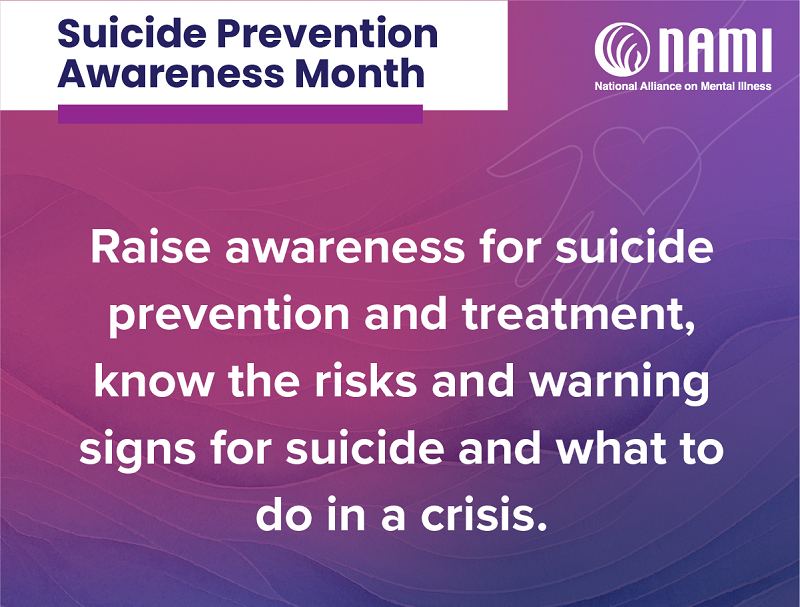National Suicide Prevention Month – NAMI – If you or someone you know is experiencing a mental health crisis, call or text 988 immediately. If you are uncomfortable talking on the phone, you can chat with the Suicide & Crisis Lifeline at 988lifeline.org. See Warning Signs of Suicide.
This month is a time to raise awareness and discuss this highly stigmatized topic, and to spread hope and vital information to people affected by suicide. The goal is to ensure that individuals, friends and families have access to the resources they need to discuss suicide prevention and to seek help. This site linked above from the National Alliance on Mental Health offers a wide range of information and tools on crisis resources, how to engage with Suicide Prevention Month, key facts, blogs, personal stories, and more.
Related:
- National Suicide Prevention Week September 10-16
- National Suicide Prevention Day – September 10
- From our blog: 988: The Suicide and Crisis Lifeline
Healthy Aging Month – For the 30th year, September is designated as Healthy Aging Month, focusing on the positive aspects of growing older, and encouraging everyone to take personal responsibility for their health. Here’s a question related to aging: Do you think you’ll live to be 100? Use the Life Expectancy Calculator to get an estimate. About one in every 5,000 people in the U.S. is a centenarian, someone who’s 100+ years old, and about 85% are women. Experts say that about 25-30% of longevity can be attributed to genetics, but the rest relates to where you live, your diet, how much you exercise, and your support network of friends and family. You can add years to your life expectancy by making improvements in diet and activity levels. Those who study centenarians offer these tips to improve your odds:
- Thomas Perls, director of BU’s New England Centenarian Study, talks about why some people live to be 90+ years old. He offers five daily practices that can increase your longevity: 1. Manage your stress levels. 2. Get good sleep. 3. Eat healthy: Stick to a Mediterranean or Keto-type diet with whole foods, healthy fats, and lots of fruits and vegetables. Avoid excessive consumption of red meat. 4. Exercise often. 5. Refrain from smoking.
- Dan Buettner studied the diets of places in the world called “Blue Zones, where people have long life expectancies. He offers this advice: 1. Eat a cup of beans, peas, or lentils every day. 2. Eat a handful of nuts daily. 3. Eat breakfast like a king, lunch like a prince and dinner like a pauper. 4. Eat meals with your family.
ESI EAP members can log in to www.theEAP.com to explore some aging-related self-help tools, including:
- Aging and Elder Care Resources – Healthy aging, memory loss, daily living & more
- Late Life Planner – Retirement planning, wills, insurance, and financial matters
- Eldercare Locators – Find local assisted living, nursing homes, in-home services & more
World Alzheimer’s Month – With the number of people living with dementia set to almost triple by 2050, it has never been more important to recognize the risk factors associated with dementia and take proactive steps towards risk reduction. As such, this year’s theme ‘Never too early, never too late’, centers on the key risk factors and risk reduction, aiming to emphasize their crucial role in delaying and potentially preventing the onset of dementia. This also importantly includes ongoing risk reduction for those who have already been diagnosed.
Falls Prevention Week – 9/18 – 9/22 – Falls can cause injuries for anyone at any age, but older adults are particularly susceptible. According to the CDC, falls are the leading cause of injury-related death among adults age 65 and older, and the age-adjusted fall death rate is increasing. If you are older or have someone older in your household, check out the linked CDC site for a variety of tools and resources,
Other noteworthy September dates:
- 9/4 – Labor Day
- 9/15 – 10/15 – National Hispanic Heritage Month
- National Sickle Cell Month
- National Preparedness Month
- National Yoga Awareness Month
- National Cholesterol Education Month
- Childhood Cancer Awareness Month
- Blood Cancer Awareness Month
- Ovarian Cancer Awareness Month
- Prostate Cancer Awareness Month
- Thyroid Cancer Awareness Month
Blog posts you may have missed

